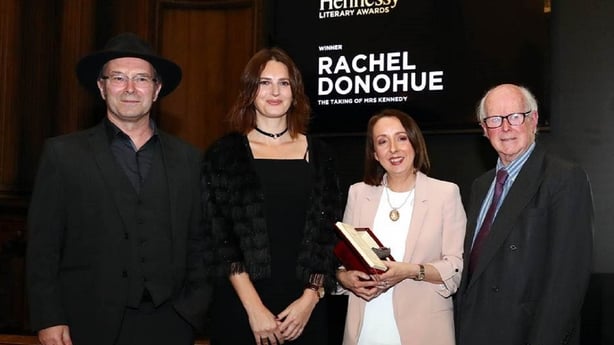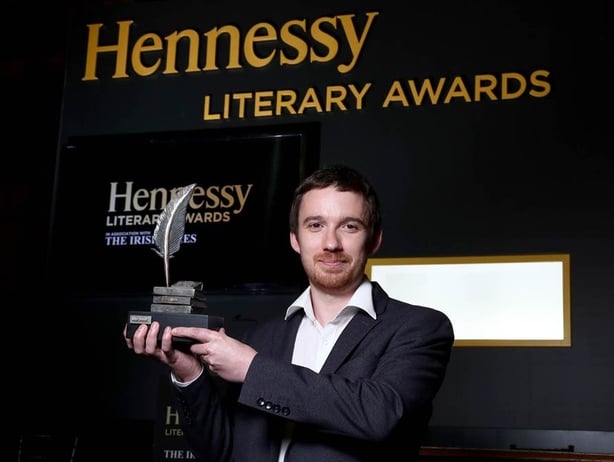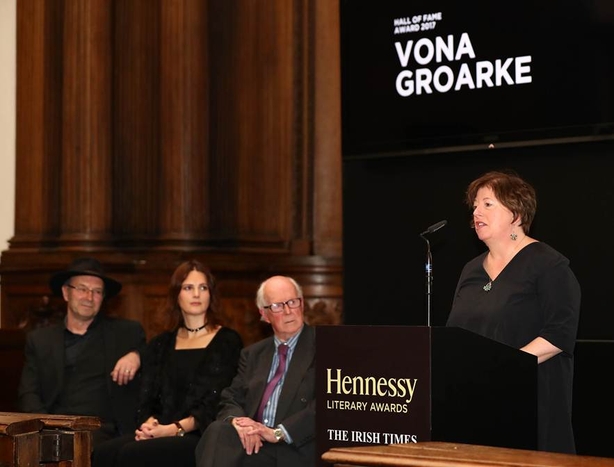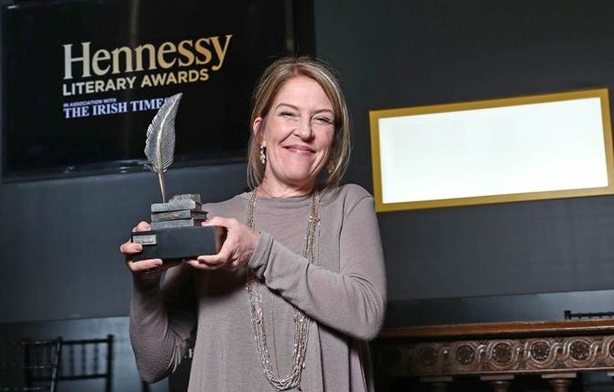'But then I realise, the wanting to miss the life you have, is the point of her, her lover and all those with the energy to be restless.'
-From The Taking of Mrs Kennedy by Rachel Donohue, winner of both the Emerging Fiction category and the New Irish Writer of the Year 2016 at the Hennessy Literary Awards which took place in the Baroque Chapel in IMMA yesterday evening.
“To know you’re nominated was great for me, that was already a win," says Donohue. "It’s a huge honour. The award is such validation. Knowing you have stories that people might take something from or want to listen to or read - for me it’s all about being able to tell stories, and you want someone to enjoy them. That was the big thing for me this evening.” In The Taking of Mrs Kennedy, Donohue gives a nod to one of the National Gallery’s prized artworks. “My inspiration is non linear," she says, "it’s more of a mood than character driven. I sat down to write a ghost story and this emerged. It still holds elements of that in it; something underneath an ordinary life haunting you and I love Carravagio’s The Taking of Christ. It always stops me; the idea of there being a betrayal, a moment of fate, a dark fate.”

Mike McCormack, Elizabeth Day and Ciaran Carty
Una Mannion was announced winner of the Emerging Poetry prize for her work Crouched Burial. Inspired by the find of a 2000-year old skeleton in her field, Una’s poem centres around an Iron Age burial. “I felt like an archaeologist writing it," she says, "I always wanted to write and this poem began as a prose piece. I just kept sweeping away more and more, and digging and digging. The language I was using heightened that it wanted a different resolution than prose could give it.” Una has taught literature for over 30 years, and works in IT Sligo: “This means everything to me and it’s so important for my students, for IT Sligo, for Sligo.”

Winner of the First Fiction category Sean Tanner was overwhelmed receiving the award. “I wasn’t good at English in school," he says. "I didn’t go to college. I used to write elaborate emails to friends, one of which was a journalist, and he commented that I was good and should keep at it.” Duly encouraged, Sean wrote more and more and began submitting pieces. “I received loads of rejections, but figured that was normal," he says, "and then one day I received a really good rejection from (Hennessy Prize director) Ciaran Carty inviting me to submit more pieces, and that really woke me up and became my focus. To get published in the fist place was amazing, but to win? Its crazy, like!”
Also honoured on the night was the newest member of the Hennessy Literary Hall Of Fame, poet Vona Groake. Having grown up in the midlands in Ireland and bagged the New Irish Writer award 23 years ago as an emerging poet, the Hall Of fame prize held a particular significance. “It’s lovely to win this award," she says, "and lovely to be back here among writers I really admire.” Drawn to the more concentrated and particular structure of the poetic form, Groake is a passionate advocate of the medium: "It’s about attending to the words, putting together words that have some sort of charge to them, that aren’t just dead words, words that are lively, interesting and that claim some sort of space in a world in which a lot of language is deflated and dead and false. Poetry is about trying to provide some sort of correction to that, I think.”

listen to Hall Of Fame winner Vona Groarke
Joining Ciaran Carty on the judging panel for this year's awards was Solar Bones author (and multiple award winner) Mike McCormack, who applauded Vona Groake for “defying categorisation” when presenting the Hall Of Fame honour - whilst recalling with some amusement his competing for victory against her in the Hennessy Awards 23 years previously. "My heart sank when I read her work then," he says, "knowing this was a master of her art.”
Also on the judging panel was award winning journalist and author Elizabeth Day, who noted that McCormack and herself had both agreed on the top two finalists for each category. “We were both drawn to writers with a unique voice," she says. "Sean Turner, for instance, has a voice that just belts you round the face with its energy and verve. The prose just fizzes and sparkles. It’s really instantly engaging. Rachel Donohue engaged us in a different way. Her voice is one of poise and elegance; someone who has clear mastery of the form. Then Una’s poem is so moving and lyrical. In all three cases, although they expressed their voices differently, they all had a very unique sound when you read them on the page."

Elizabeth had sound advice for those who didn’t win on the evening: “Keep writing, and believe that they are good enough. By purely being shortlisted, they are among the greatest emerging writers in Ireland today - and by being one of the greatest writers in Ireland today, they are one of the greatest emerging writers in the world, because the Irish literary culture is unparalleled.”


